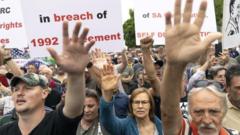In a landmark ruling, a South African court has dismissed allegations of a "white genocide" in the country, branding them as "clearly imagined" and "not real." This decision comes in response to claims made by notable figures such as US President Donald Trump and entrepreneur Elon Musk, who have both drawn attention to the plight of white farmers in South Africa. The court's ruling specifically blocked a $2.1 million donation intended for the white supremacist group Boerelegioen, which aimed to propagate messages of racial division and hatred.
### South African Court Rejects 'White Genocide' Claims, Upholds Anti-Hate Sentiment

### South African Court Rejects 'White Genocide' Claims, Upholds Anti-Hate Sentiment
A ruling against a bequest to a white supremacist group reveals the complexities of race discourse in South Africa.
The court's actions stemmed from a bequest by Grantland Michael Bray, who had become increasingly consumed by these unfounded fears during the last decade of his life. His siblings contested the legality of the bequest, citing their brother's growing paranoia and obsession with racial conflict, exacerbated by extremist online content. The judge underscored that Bray's assertions of impending genocide lacked factual basis and were a product of delusion, influenced by his ongoing racism and mental health struggles.
While entities like Boerelegioen claim to provide civil defense and security services, the court sided with Bray's siblings, affirming that the organization aimed to spread racial hatred and separation. In stark contrast, local crime statistics reveal that the fears surrounding targeted violence against the white community do not align with the actual threat levels faced by different demographics in South Africa. The court ruling not only signals a strong stance against racial extremism but also challenges political narratives that exaggerate the plight of a minority.
This decision highlights the ongoing complexities of race relations in South Africa and the broader implications of misinformation on both a local and international scale, especially as global figures amplify these discussions.
While entities like Boerelegioen claim to provide civil defense and security services, the court sided with Bray's siblings, affirming that the organization aimed to spread racial hatred and separation. In stark contrast, local crime statistics reveal that the fears surrounding targeted violence against the white community do not align with the actual threat levels faced by different demographics in South Africa. The court ruling not only signals a strong stance against racial extremism but also challenges political narratives that exaggerate the plight of a minority.
This decision highlights the ongoing complexities of race relations in South Africa and the broader implications of misinformation on both a local and international scale, especially as global figures amplify these discussions.





















